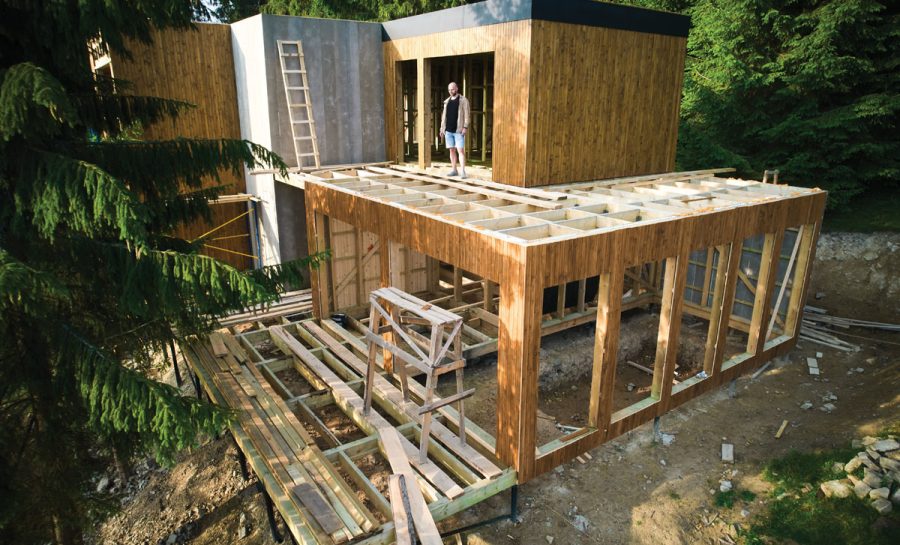Advanced Building Techniques for Modern Homes
By Jeff Eckes | Fall 2024 | Features
Those of us of a certain age who grew up in New York fondly remember the catchphrase of the off-price clothing chain Syms—“an educated consumer is our best customer.” And why not? It is brilliant marketing help your customer feel like they are smarter than everyone else, just because they shop for suits at your business. Syms also backed up his claims with excellent service, despite some of the lowest prices found anywhere on name-brand menswear. I remember buying my first high-quality suit there, and the detailed responses to my questions by the tailor that was fitting me informed my clothes buying of all kinds for decades to come. Maybe Syms customers really were smarter, at least at buying suits.
Though that story seems to have little relevance to this magazine, it has more relevance than one might think. We are in an age of advancement in building science, which is all of the science related to building the structures that allow us to survive on this planet. Not just renewable energy sources, but window and door technology that can seal so well it all but seals your home from outside effects, including most of the components of smoke and nearly 100 percent of dust and pollen. It includes the very floors, walls, and roofs we build the home from, and even the way a building is sited on a property and how deep the windows are to be mounted in the walls, and on each different side of the house as well.
The science is no longer a question, it’s just a matter of perfecting the processes, which brings costs down. This is one of the missions that I have taken on with LDR Group and what we do with high performance housing.

A minimalist home built to Passive House standards, which are the gold standard for energy-efficient buildings.
Computer simulation programs that have been developed specifically for these calculations are familiar to architects and engineers, and more and more of them, and even a few home builders, have embraced these building ideas and the systems that enable them. Training is becoming more accessible, and specialized materials that perform at several orders of magnitude better than the ones we have been using for decades, or even centuries, are becoming available at more and more suppliers at lower prices as they are more widely adopted. But no new building system, or readily available materials, will matter if the people who own these buildings don’t know about them, or worse still, their hired professionals don’t. Or don’t care.
An educated consumer is their own best advocate. I know, not as catchy as what Sy Syms came up with (though after filing for bankruptcy in 2011, his phrase may be available) but it may be one that saves you a lot of money and heartache. Learning about the science of a thing, as in nearly all other aspects of life, provides a deeper understanding promotes better decision making. That’s great you say, but who has time for a degree in building science from Rensselaer Polytechnic Institute? Fortunately, that’s not required.
Here are some resources to educate yourself on building science. If you are remodeling or building a house today, this information will help you understand how and why to build a home using the most advanced science. Upstate House will always be a great source of basic information, and as important, the local businesses that provide these advanced, science-based products and services, but to go deeper, consider these sources.
NYSERDA
NYSERDA is the New York agency that deals with all things energy. They not only administer all the state and federal rebates and tax credits, they also support basic building science research though grants and symposia. It would do any homeowner well to familiarize yourself with this agency.
Energy Star Program
The Energy Star program is administered by the Environmental Protection Agency (EPA). It’s one of the largest and best-known energy savings brand the government has, recognizable from the label on just about any appliance. They provide lots of information about available products, but did you know that you can have a home built with an Energy Star rating? The EPA also administers the New Zero program, which aims to affect these important issues on a large scale, but is also chock full of terrific information on what’s coming and cutting edge that we will see in the general market in the future.
Passive House Institute
The original organization that began researching, designing, and eventually certifying high-performance housing is based in Germany, but very active all over the US. The Passive House Institute’s website is a bit information-dense, but search can find you valuable science-based information on just about any aspect of this kind of building. Their website contains some of the best resources for Passive House education and certification, as well as connections to active regional members, like Passive House Empire State, the chapter that LDR Group is active in.
BuildingAdvisor.com
This is a very well-known site for builders and remodelers, and for DIY homeowners who are looking for practical advice on just about anything to do with buildings. Some of the archive articles are a bit dated, but all of the advice is solid, especially if cross referenced with the next resource.
PHIUS
The US-based outgrowth of Passive House Institute. The certification processes and requirements are similar, but different, some of which are more appropriate for some types of buildings than others. In reality, the agency that certifies has more to do with the architect/builder you choose. Both will result in a home that is light years ahead of the standard code-built home in comfort, energy use, and resiliency available from the vast majority of homebuilders. PHIUS also has a local chapter that is very active in the Hudson Valley.
Greenbuildingadvisor.com
Greenbuildingadvisor.com is a wonderful resource that is utilized by novice and advanced builders alike. I have been a member for years (if you are building or remodeling, it’s just $15 a month to join) and make extensive use of their drawing detail library to explain concepts to clients and sub-contractors alike.
Maybe under the warming light of all of these incredible resources that are available to us, we should adopt a new tag line? A self-educated consumer is their own best customer!
Jeff Eckes is the CEO of LDR Group, a Passive House a design/build/renovate contractor located in the Mid-Hudson Valley. His new podcast on high-performance housing technologies, “Passive Aggressive,” is available on podcast platforms.
